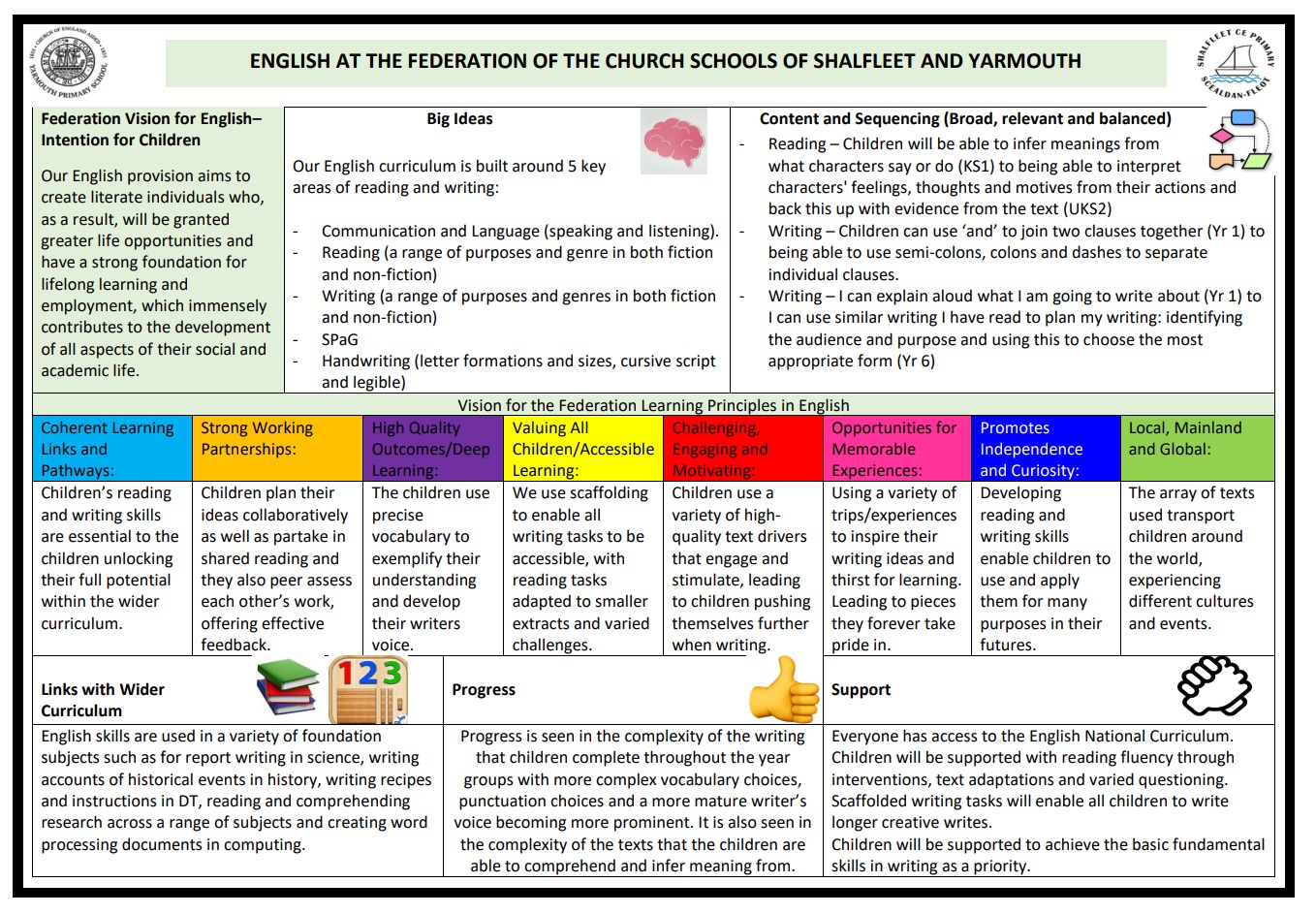curriculum
EnglishEnglish
National Curriculum Statement
Purpose of study
English has a pre-eminent place in education and in society. A high-quality education in English will teach pupils to speak and write fluently so that they can communicate their ideas and emotions to others, and through their reading and listening, others can communicate with them. Through reading in particular, pupils have a chance to develop culturally, emotionally, intellectually, socially and spiritually. Literature, especially, plays a key role in such development. Reading also enables pupils both to acquire knowledge and to build on what they already know. All the skills of language are essential to participating fully as a member of society; pupils who do not learn to speak, read and write fluently and confidently are effectively disenfranchised.
Aims
The overarching aim for English in the national curriculum is to promote high standards of language and literacy by equipping pupils with a strong command of the spoken and written language, and to develop their love of literature through widespread reading for enjoyment. The national curriculum for English aims to ensure that all pupils:
- read easily, fluently and with good understanding
- develop the habit of reading widely and often, for both pleasure and information
- acquire a wide vocabulary, an understanding of grammar and knowledge of linguistic conventions for reading, writing and spoken language
- appreciate our rich and varied literary heritage
- write clearly, accurately and coherently, adapting their language and style in and for a range of contexts, purposes and audiences
- use discussion in order to learn; they should be able to elaborate and explain clearly their understanding and ideas
- are competent in the arts of speaking and listening, making formal presentations, demonstrating to others and participating in debate
Our Intent
We know that Literacy is fundamental to all areas of learning as it unlocks access to the wider curriculum. A literate individual is granted greater life opportunities and the foundation for lifelong learning and employment, which strongly contributes to the development of all aspects of social and academic life. In 2018, Ofsted said that it was hard to overstate the importance of early literacy, as reading is the gateway to almost every other subject and to children discovering their own unique interests and talents; build a robust vocabulary and ‘unlock the door’ to their curriculum.

Developing Children’s Spoken Language and Listening
- High quality adult interactions.
Adult interactions and the role of questioning by an adult is key to unlocking the full potential of child led learning. Staff are supported to deepen their understanding of the value of questioning children to extend a child’s thinking but to also value the role of being the observer – listening and taking note from a distance. During class discussions, assemblies and opportunities to sit together and talk – sharing experiences, our learning and listening to those around us.
- Modelled language.
The positive use of rich language is embedded within our early years classrooms and is continued through Key Stage 1 and 2. Adults model language continuously to children, repeating and correcting speech, introducing children to new words, consolidating the meaning of existing language.
- Time to listen to stories, books, poems, rhymes.
Reading time is a key part of each day, with several opportunities for the children to join together as a class to listen to or read a story, rhyme, poem with an adult. Discussions and writing opportunities are then generated from this.
Developing Children’s Reading
- Delivering a systematic phonics program.
- Investing in reading schemes to support early reading.
- Celebrating the value of books with children through story time and library time.
- Observing the role and importance of reading (role models).
- Creating a love for reading (reading for pleasure).
- Teaching the key reading skills.
- Regular reading 1:1 giving children time to practice their reading strategies.
- Whole class reading opportunities.
- Creating opportunities for reading through the wider curriculum.
- Helping children to discover that love of reading (reading for pleasure time slots in class).
- Teaching a range of reading skills.
- Building word recognition and use of vocabulary.
- Engaging and supporting families with reading.
Developing Children’s Writing
- Spelling and Phonics
During phonics, children are offered focused opportunities to apply their developing skills, using sound buttons to sound out individual words, progressing to whole sentences. Tricky words are embedded into the teaching of phonics, with opportunities given to children to read, write and apply the new words they acquire. Spelling incorporates the teaching of patterns, rules and Common Exception words.
- Handwriting
Handwriting goes through a journey during the Reception year, progressing from opportunities offered through play to short, regular, discrete handwriting sessions. Our Early Years children are encouraged to use and play with a range of resources with links to the children’s interests e.g. copying letters/words with paints, chalks, a range of pens (including invisible spy pens, highlighters) and word wands/props. In Year 1, we progress to more formal handwriting lessons, more emphasis is then needed on supporting posture, seating position and pencil grip. The Read, Write Inc. rhymes are used to embed correct letter formation. As a Federation we support our children to form letters correctly, progressing through the stages to being able to use a pen to demonstrate a neat, cursive script by Year 6. At this stage, all pupils are expected to have legible handwriting.
- Opportunities to write
We work from the children’s interests in the Reception year, meaning children engage in purposeful opportunities to write with motivation and interest. Their writing skills develop through the years, progressing from mark making that serves meaning to the child, labels and captions, sentences and then on to longer extended pieces that are written and edited independently. Our pupils learn about the importance of writing for a purpose and addressing an audience. We also expose them to a range of reading and writing genres. Resources are placed around the environment to ensure children can easily and independently access the tools they need to support their writing (this includes interactive working walls). We encourage regular opportunities for short and long writing experiences.
Modelled writing
We incorporate the use of model examples and language ideas into our writing programme . This helps to form a greater understanding of the value and role of written text. This may be a whole class opportunity to write with the teacher or to encourage them to follow model examples and ‘magpie’ ideas picked from a text extract.. Links are made to other year groups too, with opportunities taken e.g. for older year groups to interact with Reception children and write stories based on their interests. Model examples written by children of the same age, attending other schools are also shared with our children (see the Hampshire Moodle for examples).
Monitoring & Evaluating
Impact of the implementation of the teaching of Early Literacy Skills is measured in a variety of ways.
These include:
- Talking to children and families about their experiences
- Time spent by the Literacy Lead and SLT in the learning environments and monitoring of Literacy lessons across our Federation
- Analysis of our own assessment data and formal test results
- Looking at samples of children’s work and evidence of their learning journeys shown in their Literacy books (book scrutiny) and on display walls
- Regular Literacy reports submitted from the Literacy Leader to SLT and Governors
- Regular feedback to teachers from the Literacy Leader
- Monitoring of working walls in classrooms to achieve a whole Federation approach
- Moderation of writing standards within the Federation and with other Isle of Wight and Hampshire schools
